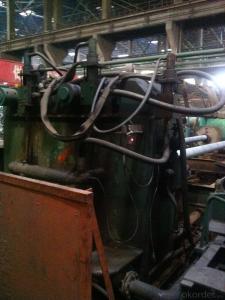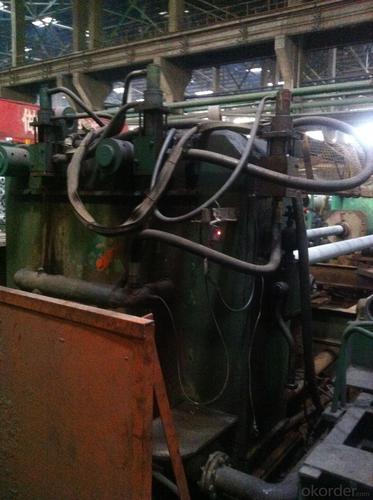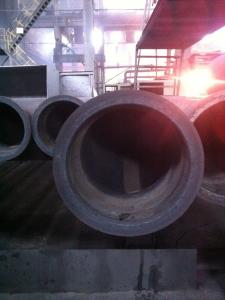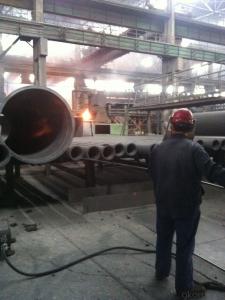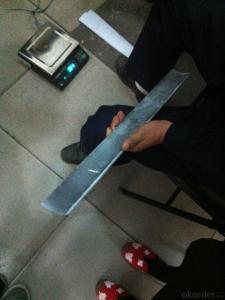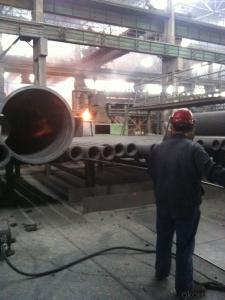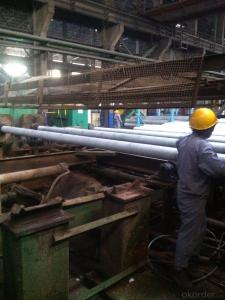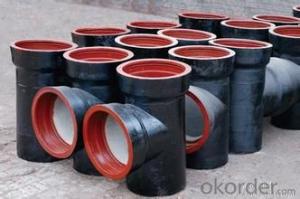DUCTILE IRON PIPE AND PIPE FITTINGS K9 CLASS DN1000
- Loading Port:
- Tianjin
- Payment Terms:
- TT OR LC
- Min Order Qty:
- 23 pc
- Supply Capability:
- 3000 pc/month
OKorder Service Pledge
OKorder Financial Service
You Might Also Like
Material : Ductile Cast Iron
Size Range : DN 80mm to DN 2000mm
Unit Effective Length : 6m or 5.7m
Manufacture Standard: ISO 2531:1998/ EN 545:2006/EN 598:2007
Annual capacity : 200,000 tons
Coating Exterior: Zinc 130g/m2 according to ISO 8179-1 and bitumen coating 70 microns.
Cement Interior: Portland Cement/ High Alumina Cement/ Sulphate Resisting Cement Lining according to ISO 4179
Special requirements on external coating and internal lining can be applied
We also provide accessories such as SBR/EPDM rubber gaskets, lubricant paste, pipe caps, PE sleeves, etc.
Additional Parts:
Each pipe is strictly inspected according to related standard to ensure permanently high performance.
Easy Installation at site and service free for life
Long Service Lifespan
Quotation will arrive you within 24hours once we get your inquiry.
We guarantee offering you a competitive price.
A copy of original inspection reports of pipes will be offered after shipment.
Photos of loading process will be sent to the customer after shipment effect.
We will follow-up the delivery progress after shipment effect and update to the customer on weekly basis.
- Q: Can ductile iron pipe be used for trenchless installation methods?
- Yes, ductile iron pipe can be used for trenchless installation methods. Trenchless installation methods, such as pipe bursting or horizontal directional drilling, are suitable for various pipe materials including ductile iron. Ductile iron pipes are known for their strength, durability, and flexibility, making them suitable for trenchless methods where the pipe needs to be installed without an open trench.
- Q: The difference between ductile cast iron pipe and machine-made cast iron pipe
- Different appearance, ductile iron pipe single length of 6 meters, large wall thickness; mechanism cast iron pipe single length of 3 meters, the wall thickness is thin.
- Q: Ductile iron pipes perennial bubbles in the water will rot it
- Water supply pipe is the first choice, with high cost performance. Compared with the PE pipe, from the installation time, ductile pipe PE pipe installation is simple and rapid, and after the installation of internal and external pressure bearing better tightness and corrosion resistance; from the point of view, ductile pipe sealing better after installation, but also can improve the corrosion resistance through various anti-corrosion methods;
- Q: Can ductile iron pipes be used for both water and sewage systems?
- Yes, ductile iron pipes can be used for both water and sewage systems. Ductile iron pipes are known for their strength and durability, making them suitable for various applications. They have excellent resistance to corrosion and can withstand high pressures, making them ideal for transporting both water and sewage.
- Q: Nodular cast iron, heat treatment process and so on
- White cast iron is one of the defects. Firstly, control of carbon equivalent, carbon equivalent is not too high. The second inoculation is reasonable, the step of determining whether carbon in cast iron with graphite precipitation. Ensure adding good inoculant humectant and sufficient time. Once again, the problem of cooling. The cooling can not be too fast, easy fast cooling to produce white tissue.
- Q: Can ductile iron pipes be used for underground sewage systems?
- Yes, ductile iron pipes can be used for underground sewage systems. Ductile iron is a strong and durable material that is resistant to corrosion and can handle the high pressure and constant flow of sewage. Additionally, ductile iron pipes have a long lifespan and require minimal maintenance, making them suitable for underground sewage systems.
- Q: Are ductile iron pipes suitable for wastewater pumping stations?
- Ductile iron pipes are well-suited for pumping stations that handle wastewater. This material is known for its strength and durability, making it capable of withstanding the tough and corrosive properties of wastewater. It boasts exceptional resistance against wear, corrosion, and impact, which makes it a dependable choice for wastewater applications. Moreover, ductile iron pipes possess a high tensile strength and can handle high-pressure situations, thus proving their suitability for pumping stations that transport wastewater across long distances or elevated areas. The smooth inner surface of ductile iron pipes also aids in reducing friction, promoting the smooth flow of wastewater and minimizing the risk of blockages. In conclusion, ductile iron pipes offer a cost-effective and durable solution for wastewater pumping stations.
- Q: Can ductile iron pipes be used for irrigation of golf courses?
- Certainly, ductile iron pipes are applicable for the irrigation of golf courses. Renowned for their durability, strength, and resistance to corrosion, these pipes are suitable for a wide range of uses, including irrigation systems. They possess the ability to endure high-pressure water flow and are less prone to cracking or breaking when compared to alternative materials. Moreover, ductile iron pipes boast an extended lifespan, minimizing the necessity for frequent maintenance or replacement. Consequently, they represent a dependable option for the irrigation of golf courses, where a continuous and efficient water supply is imperative for sustaining healthy turf and landscaping.
- Q: What are the different accessories available for ductile iron pipe?
- To enhance the functionality and ensure efficient operation of ductile iron pipes, there is a range of accessories available. Some commonly used accessories include: 1. Flange Adapters: These accessories allow for the connection of ductile iron pipes with other pipe materials or equipment, such as valves, pumps, or fittings. Flange adapters provide a secure and leak-proof connection. 2. Mechanical Joint Fittings: These fittings are employed to join ductile iron pipes together. They consist of a gland, gland follower, and bolts, enabling a flexible and easily adjustable connection. 3. Restrained Joint Fittings: These fittings are utilized in applications where it is necessary to restrain the pipe to prevent movement or separation. They ensure stability and prevent potential damage caused by external forces or pressure. 4. Thrust Blocks: Concrete structures known as thrust blocks are employed to resist the thrust generated by internal pressure in ductile iron pipes. They prevent pipe movement and maintain stability. 5. Valve Boxes: Valve boxes offer protection and easy access to valves installed along the ductile iron pipeline. They are typically made of cast iron or polymer materials and are available in various sizes and designs. 6. Hydrant Assemblies: Hydrant assemblies are installed for the purpose of fire protection. They consist of a ductile iron pipe, a hydrant valve, and a fire hydrant. These assemblies are crucial for quick access to water during firefighting operations. 7. Tapping Saddles: Tapping saddles are employed to create a branch connection on a ductile iron pipe without interrupting the flow. They provide a convenient way to install service connections, valves, or meters. 8. Pipe Restraints and Supports: These accessories are used to secure ductile iron pipes to structures or prevent excessive movement. They help maintain proper alignment, prevent sagging, and ensure the structural integrity of the pipeline. 9. Pipe Repair Clamps: In the event of pipe damage or leaks, repair clamps offer a quick and temporary solution. These clamps are designed to fit around the damaged area and provide a tight seal to stop the leak. 10. Gaskets and Seals: Gaskets and seals are crucial accessories for ensuring leak-free connections. They are available in various materials, such as rubber or synthetic compounds, and are used to create a watertight seal between pipes or fittings. These are just a few examples of the accessories available for ductile iron pipes. The selection of accessories depends on the specific requirements of the project, and it is recommended to consult with a pipe supplier or engineer to ensure the appropriate accessories are chosen for the application.
- Q: Can ductile iron pipe be used in corrosive environments?
- Yes, ductile iron pipe can be used in corrosive environments. Ductile iron is known for its ability to resist corrosion and has been widely used in various applications where corrosion resistance is required. The corrosion resistance of ductile iron is due to its protective oxide layer, which forms naturally on its surface and acts as a barrier against corrosive elements. Additionally, ductile iron pipes can be coated with various protective coatings such as polyethylene or epoxy to enhance their resistance to corrosion. These coatings provide an extra layer of protection, making ductile iron pipes suitable for use in highly corrosive environments such as wastewater treatment plants, industrial plants, and marine applications. However, it is important to consider the specific corrosive elements present in the environment and consult with experts or follow industry standards to ensure the appropriate coating and maintenance practices are implemented for long-term performance and durability.
Send your message to us
DUCTILE IRON PIPE AND PIPE FITTINGS K9 CLASS DN1000
- Loading Port:
- Tianjin
- Payment Terms:
- TT OR LC
- Min Order Qty:
- 23 pc
- Supply Capability:
- 3000 pc/month
OKorder Service Pledge
OKorder Financial Service
Similar products
Hot products
Hot Searches
Related keywords
